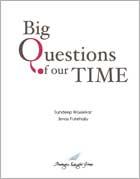Have We Just Entered An Era of Hope and Opportunity? Will It Last?
 |
March, 2009
By Sundeep Waslekar
|
A few months ago, we celebrated the victory of Barrack Obama in the US elections. We feel justified. Within the first fifty days of his administration, the world is sailing on the winds of peace and reconciliation. We are witnessing a new sense of hope in almost every part of the world.
The Obama administration has entered into a number of dialogues �€“ with Russia for reducing the stockpile of nuclear weapons, with Syria for stability in the Middle East, and with China for strategic understanding and cooperation. It has announced time-tables to close the Guantanamo Bay prisons and withdraw troops from Iraq. Its appointment of Senator George Mitchell as the Special Envoy for the Middle East is welcomed by all parties. Fatah and Hamas are moving towards a national unity government. Pakistan has admitted the role of terrorist groups on its territory in attacks on Mumbai and thereby made it difficult for them to repeat the carnage. The world is moving from an era of wars, terrorism, and the war on terror to a period of reconciliation, compromise and strategic arms reduction.
There are also institutional changes taking place that aim to bridge global divides. Gordon Brown, British Prime Minister, is striving hard to institutionalise the G-20 process at its next summit in April. Italy is expanding the G-8 outreach group to include Egypt, thus making it G-14. It is not yet clear whether the outreach group will be treated with greater degree of equality than before at the G-8 Summit in Italy. In any case, at some stage, G-20 and G8+ Outreach Group will merge to form a new college of global governance, which would have representation of at least 80% of the world�€™s population. It is bound to happen in the next five to ten years, if not earlier.
There are exciting scientific developments taking place. Research in stem cell technology and clean technologies have received fresh encouragement. The NASA has successfully launched Kepler spacecraft with a telescope to observe the earth-size planets in our galaxy. If it succeeds in its spotting some small planets in habitable distance from their parent stars, the world will move a step closer to the search of life comparable to ours in the outer space. Scientists believe that the earth-size planets with appropriate distance from their parent stars could provide scope for water and hard surface to exist, unlike most planets discovered so far which are made of hydrogen and helium gasses. If observations made by Kepler in the next 1000 days provide hope of intelligent life anywhere else in the universe, and especially in our galaxy, it will provide a new hope, a new curiosity and a new sense of purpose for humanity.
New scientific and technological research may provide answers to some of our critical problems. Recently I read an interview of Peter Glieck, a water expert and founder of the Pacific Institute in California. He says that in the United States, the usage of water has come down by 80 to 90% in the last century for production of one unit of steel and many other items. Thus, despite the growth of population and economy, the US has become a water-rich country. If it could happen in the United States, it could happen in other countries as well. Of course, there will be issues of the transfer of technology and intellectual property rights but they can be tackled.
Similarly, the development of carbon capture and sequestration technology can provide hope for climate-efficient production of energy. Solar panels and solar lanterns can bring light to almost 1.6 billion people living in darkness in the world. Of course, these technologies are expensive but mass production will bring their unit cost down. We can not expect them to be abundant in a year or two. However, a decade is a long time in economic history of the world. During this decade, we will need Obama-type of world politics of reconciliation so that the attention and resources of our leaders and people can be focussed on an agenda for human progress rather than an agenda of competitive dominance.
Our greatest hope comes from the economic crises. These crises are the result of our moral degeneration and our fondness to live beyond our means. The damage they have caused is much less than what could have happened. The old hacks will of course demand more money for rescuing the old system creating huge debt to be repaid by the new and unborn generations. Let�€™s hope that the world�€™s leaders do not fall into their trap.
They should look at the economic crisis as an opportunity to redirect our development model from the one based on bogus growth generated by credit to the one of genuine investment in sustainable agriculture, clean energy, water efficiency, health and knowledge. The crises have provided us an opportunity to create an economic system based on enlightened cooperation rather than ruthless and wasteful competition. The crisis of communism ended the competition between strategic rivals and paved way for a sustainable global polity. Let�€™s hope that crisis of capitalism will end the competition between greedy consumers and pave way for a sustainable global economy.
Related Publications
-
.jpg&maxw=50)
Big Questions of Our time: The World Speaks, 2016
Download:Big Questions of Our time: The World Speaks _Full Report
-

-

Second Freedom South Asian Challenge 2005-2025, 2005
read more
Download:Second Freedom South Asian Challenge 2005-2025 Full Report
Related latest News
Related Conferences Reports
-

Global Challenges Conference, October 2016
Download:Global Challenges Conference Report
-

Conference on Responsibility to the Future: Business, Peace and Sustainability, June, 2008
Download:Global Security and Economy: Emerging Issues


